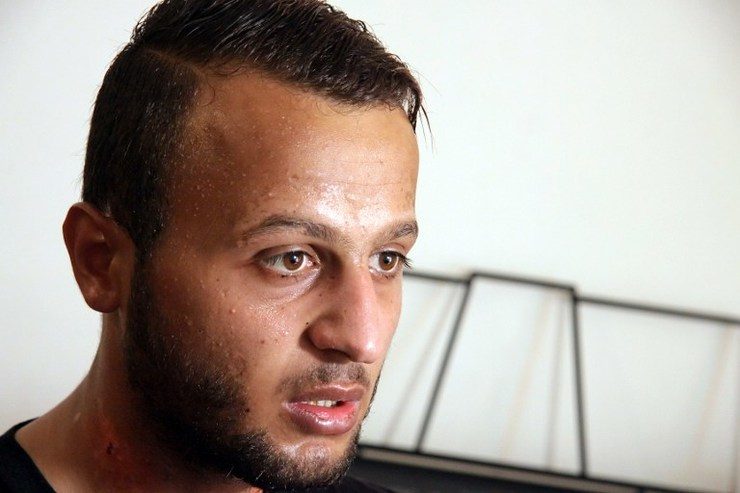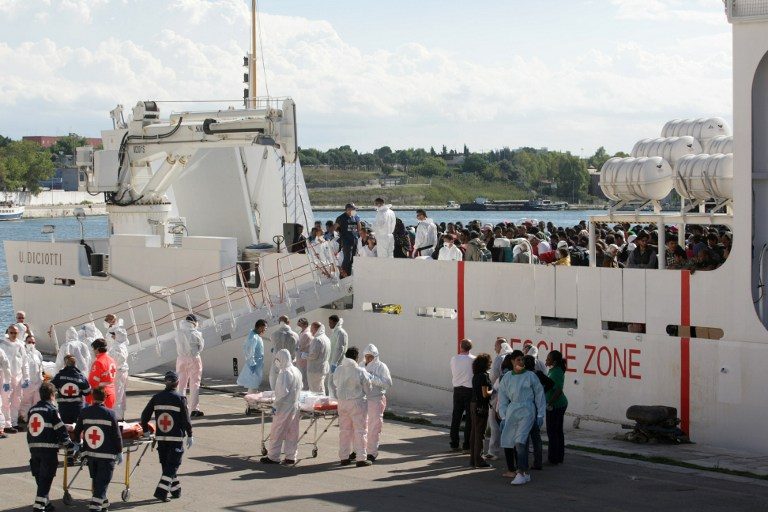SUMMARY
This is AI generated summarization, which may have errors. For context, always refer to the full article.

CHANIA, Greece – After three days adrift, drinking his own urine to survive as he watched dozens of people sink to a watery grave, Mohamed Raad started to lose his grip.
“The third day, people began going crazy,” recalled the 23-year-old Palestinian, one of just a handful of survivors of one of Europe’s deadliest migrant shipwrecks.
“I had a dream that I entered a hotel to book a room and took my lifejacket off,” he told Agence France-Presse. “That is when I realized I was sinking, and put it on again.”
Raad, a barber from Gaza, was one of some 500 people making their way from Egypt to Europe on September 10, when human traffickers rammed their vessel in what international authorities have called a “mass murder”.
He was beneath deck when the boat was hit and didn’t see it happen. But he heard the screaming that followed.
“It didn’t last long, it was a minute before the boat sunk,” he told Agence France-Presse from the port town of Chania on Crete, where he was brought after being rescued by the Greek coastguard last Friday, September 12.
Raad said he survived the sinking by climbing out of a porthole to escape, and later found a life jacket.
Between 80 and 90 people survived the initial sinking and banded together in the wreckage of the vessel. “There were women and kids that were thirsty. The men urinated in bottles and we drank it,” he said.
Children ‘slip into water’
Raad described the horror of parents having to abandon their children as they succumbed to hunger, thirst and hopeless hours in the freezing waters off Malta.
“Every day we would lose people in the sea… Some people had their children with them.
“When they died, they would let the children slip into the water.”
Nineteen-year-old Doaa Al Zamel, a Syrian woman living in Egypt, did her best to stay alive for the sake of two children entrusted into her care by desperate parents.
“My goal was to save the children, that is why I stayed alive,” she said.
Tragically, a one-year-old girl from Gaza died shortly before the rescuers arrived.
But Al Zamel managed to save a two-year-old girl from Syria, who spent five days hovering between life and death in intensive care, before her condition improved on Wednesday, September 17.

According to the International Organization for Migration (IOM), up to 100 children were part of the group making the treacherous crossing to Italy.
Raad credited his survival to the life vest, to knowing how to swim – and to his faith. “God gave me help and patience, and that is why I survived.”
Only 10 people were rescued alive. Two Palestinians were taken to Italy, two to Malta, while the other six were taken to hospital in Crete.
Those in Greece include Raad and Al Zamel, two other Palestinian men, an Egyptian man and the Syrian toddler.
The survivors have told IOM that their boat was sunk by the people-smugglers after the migrants refused to change to a smaller, less seaworthy vessel.
Others said the traffickers “laughed” as the boat sunk.
Al Zamel says the assailants were on a fishing boat and appeared to be Egyptians or Libyans.
“(They) asked us to stop. They started throwing metallic objects and wood while swearing at us,” she said.
“They hit us until the boat sank.”
According to the UN’s refugee agency (UNHCR), over 2,500 people have drowned or gone missing attempting the crossing in 2014. In several incidents, survivors have described traffickers overfilling rickety boats or locking people below deck to suffocate.
Raad explained how a life of hardship in Gaza had forced him to face the perils of the Mediterranean crossing, a journey for which he paid $2,100 (1,600 euros) to smugglers.
“From the moment I was born I’ve never seen a good day,” Raad said.
“Always in tyranny, war, no jobs. We don’t know when we will be killed,” he said.
Al Zamel, who worked as a hairdresser in Egypt, planned to get married once she reached Italy.
Her fiance – who found the smugglers and helped arrange the crossing – died in the shipwreck. – Rappler.com
Add a comment
How does this make you feel?
There are no comments yet. Add your comment to start the conversation.